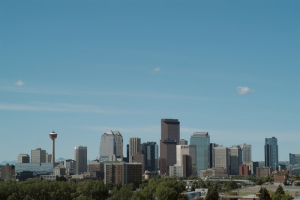Calgary's surge in MR wait times – is scan overuse the culprit?
por Thomas Dworetzky, Contributing Reporter | August 18, 2016
MRI

Downtown Calgary
Canadians in Calgary face surging wait times for MR scans – but are all those exams really needed?
Average waits at hospitals in Alberta are up 20 percent from a year ago. The average is now 18 weeks to get an appointment at a public facility. In June, 2015, it was 14.9 weeks.
To top it off, there has been a 13.5 percent bump-up for non-urgent scans just since the beginning of 2016.

 “Specifically, there has been a steep increase in the number of follow-up MR scans, resulting in longer waits for elective/non-urgent patients,” Alberta Health Services (AHS) spokesperson Colin Zak emailed to the Calgary Herald.
“Specifically, there has been a steep increase in the number of follow-up MR scans, resulting in longer waits for elective/non-urgent patients,” Alberta Health Services (AHS) spokesperson Colin Zak emailed to the Calgary Herald.
This comes at a time when actual non-urgent procedures have held steady, Calgary-zone diagnostic imaging chief Dr. Richard Walker told the paper, stating that “we’re working with physicians to ensure the right procedures are being done for the right reasons.”
The AHS has 30 MR scanners.
One of the reasons for the bump in usage could well ring a familiar note with U.S. health care providers. “Too often, family physicians or primary care doctors are prescribing MRs as a first course of action,” especially when patients insist from frustration or out of pain, Jennifer Zwicker, health policy director for the University of Calgary’s School of Public Policy advised.
Fully a third of MRs that may be unneeded stem from complaints about lower back pain.
In fact, a 2015 study of MR usage by Alberta and Ontario researchers found that over half of MRs on patients with low back pain were “inappropriate or of questionable value,” orthopedic surgeon Dr. Nick Mohtadi, a clinical professor at the University of Calgary and Director of the Acute Knee Injury Clinic, noted in the Globe and Mail at the time.
That came to about 13,000 unnecessary lower back MRs a year in Alberta alone. Mohtadi's own examination at the Acute Knee Injury Clinic in Calgary found that only a third of those with knee injuries who received MRs really needed them.
“Two-thirds of the knee-injured patients who had an MR could have been accurately diagnosed using other more readily available and significantly less expensive techniques and tools. Provincially, this translates to about 4,000 knee MRs annually,” he wrote in the paper.
Putting a bottom line on this misallocation of resources, he concluded, “In these two areas alone, there may be 17,000 unnecessary MRs every year in Alberta, representing a cost exceeding C$15 million.”
Average waits at hospitals in Alberta are up 20 percent from a year ago. The average is now 18 weeks to get an appointment at a public facility. In June, 2015, it was 14.9 weeks.
To top it off, there has been a 13.5 percent bump-up for non-urgent scans just since the beginning of 2016.
We repair MRI Coils, RF amplifiers, Gradient Amplifiers and Injectors.
MIT labs, experts in Multi-Vendor component level repair of: MRI Coils, RF amplifiers, Gradient Amplifiers Contrast Media Injectors. System repairs, sub-assembly repairs, component level repairs, refurbish/calibrate. info@mitlabsusa.com/+1 (305) 470-8013

This comes at a time when actual non-urgent procedures have held steady, Calgary-zone diagnostic imaging chief Dr. Richard Walker told the paper, stating that “we’re working with physicians to ensure the right procedures are being done for the right reasons.”
The AHS has 30 MR scanners.
One of the reasons for the bump in usage could well ring a familiar note with U.S. health care providers. “Too often, family physicians or primary care doctors are prescribing MRs as a first course of action,” especially when patients insist from frustration or out of pain, Jennifer Zwicker, health policy director for the University of Calgary’s School of Public Policy advised.
Fully a third of MRs that may be unneeded stem from complaints about lower back pain.
In fact, a 2015 study of MR usage by Alberta and Ontario researchers found that over half of MRs on patients with low back pain were “inappropriate or of questionable value,” orthopedic surgeon Dr. Nick Mohtadi, a clinical professor at the University of Calgary and Director of the Acute Knee Injury Clinic, noted in the Globe and Mail at the time.
That came to about 13,000 unnecessary lower back MRs a year in Alberta alone. Mohtadi's own examination at the Acute Knee Injury Clinic in Calgary found that only a third of those with knee injuries who received MRs really needed them.
“Two-thirds of the knee-injured patients who had an MR could have been accurately diagnosed using other more readily available and significantly less expensive techniques and tools. Provincially, this translates to about 4,000 knee MRs annually,” he wrote in the paper.
Putting a bottom line on this misallocation of resources, he concluded, “In these two areas alone, there may be 17,000 unnecessary MRs every year in Alberta, representing a cost exceeding C$15 million.”
1(current)
You Must Be Logged In To Post A CommentRegistroRegistrarse es Gratis y Fácil. Disfruta de los beneficios del Mercado de Equipos Médicos Nuevos y Usados líder en el mundo. ¡Regístrate ahora! |
|










